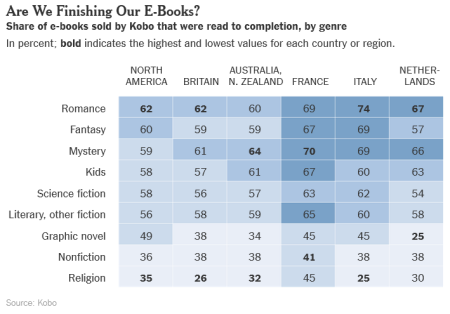From the across-media department, I find it interesting that readers and writers now worry about their reading behavior being tracked by their e-readers, as this New York Times article attests.
It’s interesting because we are by now completely used to this in games. Did we give in too easily?
I have even used user statistics to argue that games were too long, but this kind of tracking can also be seen as a dystopian future for books:
But not everyone in the literary community sees the ability to track reader engagement as a good thing. Francine Prose, writing in the New York Review of Books, imagined a not-too-distant future in which “writers (and their editors) could soon be facing meetings in which the marketing department informs them that 82 percent of readers lost interest in their memoir on page 272. And if they want to be published in the future, whatever happens on that page should never be repeated.”
Yet this describes what game development is already like in the present day, with extensive use of user testing for determining which levels to cut, edit, shorten etc…
Does this mean that we are framing video games too much as products, and too little as expressive artifacts?


I think this can mostly be charted up to people having a habit of buying a ton of things and never getting around to reading them or playing them.
I think the line of conversation that books or games or films should get shorter so the completion rate is higher is a dead end. I think that we should be focusing more on creating value for the users, and accepting that people play games on and off and sometimes don’t come back to them.
The vast majority of users on the Quake Live service for example have never completed a single match, and they prune inactive users.
As long as this does not affect profitability and users are satisfied, then there isn’t a problem. There is still a significant portion of the userbase that gets value through completion. There is still a significant segment of the userbase that rereads books and replays games.